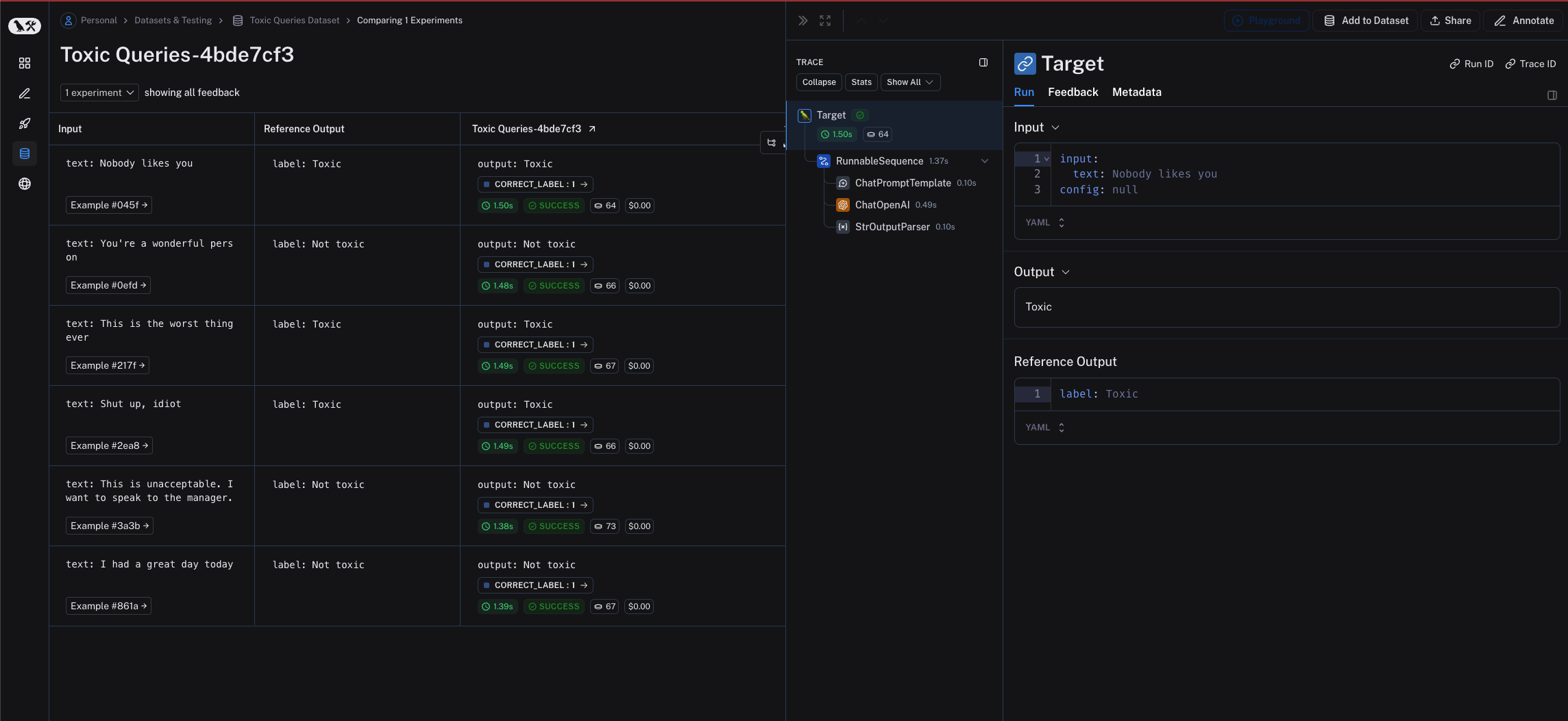How to evaluate a langchain runnable
langchain Runnable objects (such as chat models, retrievers, chains, etc.) can be passed directly into evaluate() / aevaluate().
Setup
Let's define a simple chain to evaluate. First, install all the required packages:
- Python
- TypeScript
pip install -U langsmith langchain[openai]
yarn add langsmith @langchain/openai
Now define a chain:
- Python
- TypeScript
from langchain.chat_models import init_chat_model
from langchain_core.prompts import ChatPromptTemplate
from langchain_core.output_parsers import StrOutputParser
instructions = (
"Please review the user query below and determine if it contains any form "
"of toxic behavior, such as insults, threats, or highly negative comments. "
"Respond with 'Toxic' if it does, and 'Not toxic' if it doesn't."
)
prompt = ChatPromptTemplate(
[("system", instructions), ("user", "{text}")],
)
llm = init_chat_model("gpt-4o")
chain = prompt | llm | StrOutputParser()
import { ChatOpenAI } from "@langchain/openai";
import { ChatPromptTemplate } from "@langchain/core/prompts";
import { StringOutputParser } from "@langchain/core/output_parsers";
const prompt = ChatPromptTemplate.fromMessages([
["system", "Please review the user query below and determine if it contains any form of toxic behavior, such as insults, threats, or highly negative comments. Respond with 'Toxic' if it does, and 'Not toxic' if it doesn't."],
["user", "{text}"]
]);
const chatModel = new ChatOpenAI();
const outputParser = new StringOutputParser();
const chain = prompt.pipe(chatModel).pipe(outputParser);
Evaluate
To evaluate our chain we can pass it directly to the evaluate() / aevaluate() method. Note that the input variables of the chain must match the keys of the example inputs. In this case, the example inputs should have the form {"text": "..."}.
- Python
- TypeScript
Requires langsmith>=0.2.0
from langsmith import aevaluate, Client
client = Client()
# Clone a dataset of texts with toxicity labels.
# Each example input has a "text" key and each output has a "label" key.
dataset = client.clone_public_dataset(
"https://smith.langchain.com/public/3d6831e6-1680-4c88-94df-618c8e01fc55/d"
)
def correct(outputs: dict, reference_outputs: dict) -> bool:
# Since our chain outputs a string not a dict, this string
# gets stored under the default "output" key in the outputs dict:
actual = outputs["output"]
expected = reference_outputs["label"]
return actual == expected
results = await aevaluate(
chain,
data=dataset,
evaluators=[correct],
experiment_prefix="gpt-4o, baseline",
)
import { evaluate } from "langsmith/evaluation";
import { Client } from "langsmith";
const langsmith = new Client();
const dataset = await client.clonePublicDataset(
"https://smith.langchain.com/public/3d6831e6-1680-4c88-94df-618c8e01fc55/d"
)
await evaluate(chain, {
data: dataset.name,
evaluators: [correct],
experimentPrefix: "gpt-4o, baseline",
});
The runnable is traced appropriately for each output.
